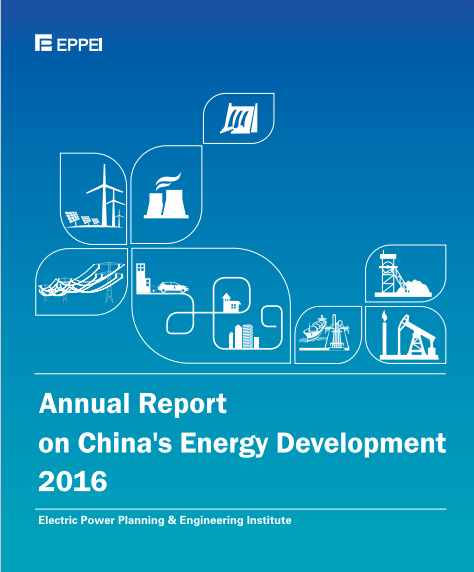Energy is the motive power propelling the modern economy to develop.
With the economy entering into a state of new normal, the energy development has correspondingly assumed a series of new features, with the consumption growth speed slowing down, the general supply and demand easing up and the internal and external situation changing. The development objectives have for long been ensuring supply and demand and effectuating a transition toward a clean, low-carbon, safe and efficient modern energy system. So, to make a good study on the annual energy development, trying to know and grasp the new features and new laws governing the development of energy industry has, therefore, become an important task of ensuring a healthy development of the energy system under the new normal.
Electric Power Planning & Engineering Institute (EPPEI) took the initiative to adapt to the new situation of energy development and organize the compilation of an annual energy development report in a bid to provide sincere and better service to the government, enterprises and the society as a whole. The Annual Report on
2016 is a year crucial in
The curtain was raised in the reform of the petroleum and natural gas industry. But concomitantly, some new problems cropped up while the old ones remained unresolved. The big price hike of coal made it difficult to lower cost. The coal-fired power installed capacity and the utilization rate of the petroleum refining and petrochemical industry declined, worsening the risks of the industry. The exacerbated curtailment of wind power and PV power made it unfavorable for energy conservation and emissions reduction. The drive of replacing coal with gas was in the doldrums, hampering the development of clean energy. Opportunities and challenges co-exist; and so do hope and difficulty. The tasks are arduous and the road is long, although the development prospects are broad.
With the “four revolutions and one cooperation” leading the way, the Annual Report on China’s Energy Development 2016 has 7 chapters, covering the overall situation of energy consumption, energy supply, energy technology, energy policies, international cooperation and insights. It puts into order and summarizes the overall situation, giving a whole picture of the energy development in 2016, spelling out how the energy industry optimized the energy structure, raised energy efficiency, lowered cost, carried out technical innovation, propelled the institutional reform and ensured energy security. It takes stock of the good performances, identifies problems, forecasts the development trend and looks into the prospects of future development.
Sincere thanks go to the departments in charge of energy and related enterprises, institutions, well-known energy experts, who have rendered great support and professional guidance in the course of compiling the report. There might be drawbacks and negligence in the report. All criticisms are welcome from experts and readers.
Profile of EPPEI
The Electric Power Planning and Engineering Institute (EPPEI) is originated from the Design Bureau of the Electric Power Administration established in 1954. In 1975, the Planning and Designing Institute of the Ministry of Water Resources and Electric Power was established. The name changed for a number of times and the institute was placed, respectively under the Ministry of Water Resources and Electric Power, the Ministry of Electric Power, the Ministry of Energy and the National Electric Power Corporation. Starting from 2011, the institute was put under the direct management of the China Energy Construction Group Co. It is an institution registered with the State Commission Office of Public Sectors Reform (SCOPSR).
As a state-level high-end consulting institute, the EPPEI mainly serves the government departments, financial institutions and energy enterprises. Its main business area covers: studies related to energy and electric power industry, e.g. industrial policy, development strategy, development planning and new technology R&D, etc.; energy and electric power project review, evaluation and consultation; as well as standardization of scientific research, information service and international cooperation.
The EPPEI sets up an
Address:
Post Code: 100120
Website: www.eppei.com
Sponsored by China Economic Information Service, Xinhua News Agency;Copyright © 2000-2015 silkroad.news.cn All Rights Reserved.
www.xinhuanet.com Beijing ICP license No.010042



